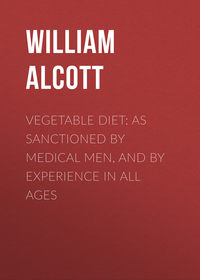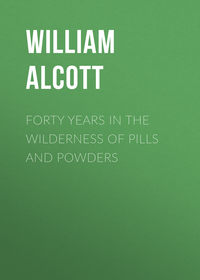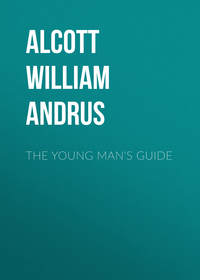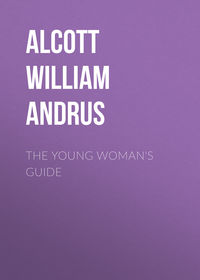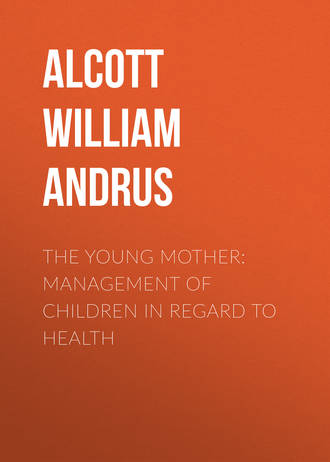
The Young Mother: Management of Children in Regard to Health
The reasons why a child ought to sleep alone, and not with the mother or nurse, are numerous; but the following are the principal;
1. The heat accumulated by the bodies of the mother and child both, is often too great for health.
2. The air is too impure. I have already spoken of the change in the purity of the air which is produced by breathing in it. It is bad enough for two adults to sleep in the same bed, breathing over and over again the impure air, as they must do more or less, even if the bed is very large;—but it is still worse for infants. Their lungs demand atmospheric air in its utmost purity; and if denied it, they must eventually suffer.
3. But besides the change of the air by breathing, the surface of the body is perpetually changing it in the same manner, as was stated in the chapter on Ventilation. Now a child will almost inevitably breathe a stream of this bad air, as it issues from the bed; and what is still worse, it is very apt, in spite of every precaution, to get its head covered up with the clothes, where it can hardly breathe anything else. This, if frequently repeated, is slow but certain death;—as much so as if the child were to drink poison in moderate quantities.
Let me not be told that this is an exaggeration; that thousands of mothers make it a point to cover up the beads of their infants; and that notwithstanding this, they are as healthy as the infants of their neighbors. I have not said that they would droop and die while infants. The fumes of lead, which is a certain poison, may be inhaled, and yet the child or adult who inhales them may live on, in tolerable health, for many years. But suffer he must, in the end, in spite of every effort and every hope. So must the child, whose head is covered habitually with the bed clothing, where it is compelled to breathe not only the air spoiled by its own skin, but also that which is spoiled by the much larger surface of body of the mother or nurse.
But I have proof on this subject. Friedlander, in his "Physical Education," says expressly, that in Great Britain alone, between the years 1686 and 1800, no less than 40,000 children died in consequence of this practice of allowing them to sleep near their nurses. I was at first disposed to doubt the accuracy of this most remarkable statement. But when I consider the respectability of the authority from which it emanated, and that it is only about 350 a year for that great empire, I cannot doubt that the estimate is substantially correct. What a sacrifice at the shrine of ignorance and folly!
It should be added, in this place, both to confirm the foregoing sentiment, and to show that British mothers and nurses are not alone, that Dr. Dewees has witnessed, in the circle of his practice, four deaths from the same cause. If every physician in the United States has met with as many cases of the kind, in proportion to his practice, as Dr. D., the evil is about as great in this country as Dr. F. says it is in Great Britain.
If a child sleeps alone, it cannot of course be liable to as much suffering of this kind as if it slept with another person; though much precaution will still be necessary to keep its head uncovered, and prevent its inhaling air spoiled by its own lungs and skin.
4. There is one more evil which will be avoided by having a child sleep alone. Many a mother has seriously injured her child by pressure. I do not here allude to those monsters in human nature, whose besotted habits have been the frequent cause of the suffocation and death of their offspring, but to the more careful and tender mother, who would sooner injure herself than her own child. Such mothers, even, have been known to dislocate or fracture a limb!20
To cap the climax of error in this matter, some mothers allow their infants to lie on their arm, as a pillow. This practice not only exposes them to all or nearly all the evils which have been mentioned, but to one more; viz. the danger of being thrown from the bed.
A young mother, with whom I was well acquainted, was sleeping one night with her infant on her arm, when she made a sudden and rather violent effort to turn in the bed, in doing which she threw the child upon the floor with such violence as to fracture its little skull, and cause its death.
Enough, I trust, has now been said to convince every reasonable young mother, where absolute poverty does not preclude comfort and health, that her child ought never to be permitted to sleep in the same bed with her; but that it should be placed on a bedstead by itself at a short distance from her, and properly guarded from accidents—and above all, from inhaling impure air.
At a suitable age, a child may be removed from the nursery to a separate chamber. Here, if the circumstances permit, it should still sleep by itself; and if the bedstead be somewhat lower than ordinary, and the room be not too small, it will need no watching.
Perhaps this may be the proper place to say that there are more reasons than one—and some of them are of a moral nature, too—why a child should continue to sleep alone, after it leaves the nursery. Nor is it sufficient to prohibit its sleeping with younger persons, and yet crowd it into the bed with an aged grandfather or grandmother, or with both. There is no excuse for a course like this, except the iron hand of necessity. And even then, I should prefer to have a child of mine sleep on the hard floor, at least during the summer season, rather than with an aged person.
Let it not be supposed I have imbibed the fashionable idea that it is peculiarly unhealthy for the young to sleep with the old. I know this doctrine has many learned advocates. And yet I doubt its correctness. I believe that the manners and habits of the old may injure the young who sleep with them, and I know that they render the air impure, like other people. But I cannot see why the mere circumstance of their being old should be a source of unhealthiness to their younger bed-fellows. Still I say, that there are reasons enough against the practice I am opposing, without this.
Some parents allow dogs and cats to sleep with children. Others have a prejudice against cats, but not against dogs. The truth is, that they both contaminate the air by respiration and perspiration, in the same manner that adults do. And aside from the fact that they are often infested by lice and other insects, and addicted to uncleanly habits, they ought always to be excluded, and with iron bars and bolts, if necessary, from the beds of children. But of this, too, I have treated elsewhere.
SEC. 3. Purity of the AirThe general importance of pure air has been mentioned. I have spoken of the elements of the atmosphere in which we live, of the manner in which it may be vitiated, and the consequences to health. I have shown—perhaps at sufficient length—the impropriety of washing, drying, and ironing clothes in the room where a child is kept; of cooking in the room, especially on a stove; of suffering the floor or clothes, particularly those of the child, to remain long wet, in the room; of smoking tobacco, using spirits, burning oil with too long a wick, &c.
All which has thus been said of the purity of the air of the nursery generally, is applicable to that of all sleeping rooms. It is an important point gained, when we can secure a nursery with folding doors in the centre, so as, when we please, to make two rooms of it. In that case, the division in which the bed is, can be completely ventilated a little before night, and thus be comparatively pure for the reception of both the mother and the child.
Shall the windows and doors where a child sleeps, be kept closed; or shall they be suffered to remain open a part or the whole of the night? This must be determined by circumstances. If there are no doors but such as communicate with apartments whose air is equally impure with that in which the child is, it is preferable to keep them closed. If the windows cannot be opened without exposing the child to a current of air, it is perhaps the less of two evils, not to open them.
But we are not usually driven to such extremities. In some instances, windows are constructed—and all of them ought to be—so that they can be lowered from the top. When this is not the case, something can be placed before the window to break the current, so that it need not fall directly upon the child. Closing the blinds will partially effect this, where blinds exist.
I have known many an individual who was in the habit of sleeping with his windows open during the whole year, and without any obvious evil consequences. Dr. Gregory was of this habit. But if adults—not trained to it—can acquire such a habit with impunity, with how much more safety could children be trained to it from the very first year. Macnish says, "there can be no doubt that a gentle current pervading our sleeping apartments, is in the highest degree ESSENTIAL TO HEALTH."
This consideration—I mean the impurity of sleeping rooms, even after every precaution has been used to keep them ventilated—affords one of the strongest inducements to going abroad early in the morning (especially when there is no other room which either adults or children can occupy) while the nursery or chamber is aired and ventilated. The utility of rising early, I hope no one can doubt; but some have doubts of the propriety of going abroad, till the dew has "passed away." Such should be reminded, by the foregoing train of remarks, that early walking may be a choice of evils; and that if it is on the whole advantageous to adults, it cannot be less so to children. And as soon as the sun has chased away the vapors of the night, if the weather is tolerable, most children should be carried abroad.
SEC. 4. The BedThis should never be of feathers. There are many reasons for this prohibition, especially to the feeble.
1. They are too warm. Infants should by all means be kept warm enough, as I have all along insisted. But excess of heat excites or stimulates the skin, causing an unnatural degree of perspiration, and thus inducing weakness or debility.
2. When we first enter a room in which there is a feather bed which has been occupied during the night, we are struck with the offensive smell of the air. This is owing to a variety of causes; one of which probably is, that beds of this kind are better adapted to absorb and retain the effluvia of our bodies. But let the causes be what they may, the effects ought, if possible, to be avoided; for both experience and authority combine to pronounce them very injurious.
3. Feather beds—if used in the nursery—will inevitably discharge more or less of dust and down; both of which are injurious to the tender lungs of the infant.
Mattresses are better for persons of every age, than soft feather beds. They may be made of horse hair or moss; but hair is the best. If the mattress does not appear to be warm enough for the very young infant, a blanket may be spread over it. Dr. Dewees says that in case mattresses cannot be had, "the sacking bottom" may be substituted, or "even the floor;" at least in warm weather: "for almost anything," he adds, "is preferable to feathers."
Macnish, in his "Philosophy of Sleep," objects strongly to air beds, and says that he can assert "from experience," that they are the very worst that can possibly be employed. My theories—for I have had no experience on the subject—would lead me to a similar conclusion. A British writer of eminence assures us that the higher classes in Ireland, to a considerable extent, accustom themselves and their infants to sleep on bags of cut straw, overspread with blankets and a light coverlid; and that the custom is rapidly finding favor. I have slept on straw, both in winter and summer, for many years, yet I am always warm; and those who know my habits say I use less covering on my bed than almost any individual whom they have ever known.
I have no hostility to soft beds, especially for young children and feeble adults, could softness be secured without much heat and relaxation of the system. On the contrary, it is certainly desirable, in itself, to have the bed so soft that as large a proportion of the surface of the body may rest on it as possible. But I consider hardness as a much smaller evil than feathers.
It is worthy of remark how generally physicians, for the last hundred years, have recommended hard beds, especially straw beds or hair mattresses, to their more feeble and delicate patients. This fact might at least quiet our apprehensions in regard to their tendency on those who are accustomed to them in early infancy.
Some writers on these subjects appear to doubt whether, after all that they say, they shall have much influence on mothers in inducing them to give up feather beds for their infants. But they need not be so faithless. Multitudes have already been reformed by their writings; and multitudes larger still would be so, could they gain access to them. It is a most serious evil that they are often so written and published that comparatively few mothers will ever possess them.
The pillow, as well as the bed, should be rather hard; and its thickness should be much less than is usual, or we shall do mischief by bending the neck, and thus compressing the vessels, and obstructing the circulation of the blood. But on this subject I will say more, when I come to treat on "Posture."
The child's bed should not be placed near the wall, on account of dampness. There is also, during the summer, another reason. Should lightning strike the house, it will be much more apt to injure those who are near the wall than other persons; as it seldom leaves the wall to pass over the central part of the room.
Curtains are not only useless, but injurious. They prevent a free circulation of the air. Everything which has this tendency must be studiously guarded against, in the management of infants.
Nothing is more injurious to the old or the young than damp beds and damp covering. It behoves, especially, all those who have the care of infants, to see that everything about their beds is thoroughly dry. The walls and clothes should also be dry; and wet clothes should never be hung up in the room. By neglecting these precautions, colds, rheumatisms, inflammations, fevers, consumptions, and death, may ensue. Many a person loses his health, and not a few their lives, in this way. The author of this work was once thrown into a fever from such a cause.
Warming the bed is, in all cases, a bad practice. While in the nursery, if the air be kept at a proper temperature, there will be no need of it; after the child is assigned to a separate chamber, its enervating tendency would result in more evil than good. It is better to let the bed became gradually heated by the body, in a natural and healthy way.
No person, and above all, no infant, should be suffered to sleep in a bed that has been recently occupied by the sick. The bed and all the clothes should first be thoroughly aired. Could we see with our eyes at once, how rapidly these bodies of ours fill the air, and even the beds we sleep in, with carbonic acid and other hurtful gases and impurities, even while in health, but much more so in sickness, we should be cautious of exposing the lungs of the tender infant, in such an atmosphere, until everything had been properly cleansed, and the apartments properly ventilated.
SEC. 5. The CoveringThe covering of the bed should be sufficiently warm, but never any warmer than is absolutely necessary to protect the child from chilliness. The lightest covering which will secure this object is the best. Perhaps there is nothing in use that, with so little weight, secures so much heat as what are called "comfortables."
The clothes should not be "tucked up" at the sides and foot of the bed with too much care and exactness. For when the bed is once warmed thoroughly with the child's body, the admission of a little fresh air into it, when he elevates or otherwise moves his limbs, can do no harm, but may do much of good, in the way of ventilation. I deem it important, moreover, to inure children very early to little partial exposures of this kind.
Those mothers who, from over-tenderness, and want of correct information on the subject, pursue a contrary course, and consider it as almost certain death to have a particle of fresh air reach the bodies of their infants during their slumbers, are generally sure to outwit themselves, and defeat their very intentions. For by being thus tender of their children, it often turns out that whenever the mother is ill, or when on any other account she ceases to watch over them—and such times must, in general, sooner or later come—they are much more liable to take cold or sustain other injury, should they be exposed, than if they had been treated more rationally.
I knew a mother who would not trust her children to take care of their own beds on retiring to rest, as long as they remained in her house, even though they were twenty or thirty years old. But they had no better or firmer constitutions than the other children of the same neighborhood.
Hardly anything can be more injurious than covering the head with the bed clothes; and yet some mothers and nurses cover, in this way, not only their own heads, but those of their children. I have elsewhere shown how impure the air is, which is imprisoned under the bed clothes. I hope those mothers who are willing to destroy themselves by covering up their heads while they sleep, will at least have mercy on their unoffending infants.
SEC. 6. Night DressesThe grand rule on this point is, to wear as little dress during sleep as possible. Some mothers not only suffer their infants to sleep in the same shirt, cap, and stockings that they have worn during the day, but add a night gown to the rest. No cap should be worn during the night, any more than in the day time. Or if the foolish practice has been adopted for the day, it should be discontinued at night. It is enough for those adults whose long hair would otherwise be dishevelled, to wear night caps, and subject themselves, as they inevitably do, to catarrh and periodical headache. Children's heads should have nothing on them by night; nor even by day, except to defend them from the rain or the hot rays of the sun.
The stockings, too, should be wholly laid aside at night, unless in the case of those who are feeble, apt to have their feet cold, or particularly liable to bowel complaints. Such may be allowed to sleep in their stockings, but not in those which have been worn all the day.
Indeed, neither children nor adults should ever wear a single garment in the night which they have worn during the day. The reason is, that there are too many causes of impurity in operation while we sleep, without our wearing the clothes in which we have been perspiring during the day-time—and which must be already more or less filled with the effluvia of our bodies.
It is a very easy thing to have a loose night gown to supply the place of the shirt we have worn during the day; and if nothing else is convenient, a spare shirt will answer. But both a night gown and shirt should never be admitted, especially in warm weather. The garment to supply the place of the shirt during the night, may be of calico in the summer, and of flannel in the winter.
The collar and wristbands of this night dress should be loose; and the whole garment should be large and long. No article of dress should ever press upon our bodies, so as in the least to impede the circulation; and for this reason it is, that writers on physical education have inveighed so much against cravats, straps, garters, &c. This caution, so important to all, is doubly so to young mothers, on whom devolves the management of the tender infant.
When the child has been perspiring freely during the evening, just before he is undressed, or when he has just been subjected to the warm bath, it may be well to use a little care in undressing and exchanging clothes, to prevent taking cold;—though it should ever be remembered, that those children who are managed on a rational system will bear slight exposures with far more safety, than they who have been managed at random—sometimes, indeed, with great tenderness, but at others, wholly neglected.
SEC. 7. Posture of the BodyIn early infancy, children who are not stuffed rather than fed, may occasionally be permitted to sleep on their backs, especially if they incline to do so. But it will be well to encourage them to sleep on one side, as soon as you can without great inconvenience.
The right side, as a general rule, is preferable; because the stomach, which lies towards the left side, is thus left uncompressed, and digestion undisturbed. I would not, however, require a child to lie always on the right side, but would occasionally change his position, lest he should become unable to sleep at all, except in a particular manner.
I have said elsewhere, that the head ought to be a little raised, especially if the child is liable to diseases of the brain. But this remark, rather hastily thrown out, requires explanation.
There is so much blood sent by the heart to the head and upper parts of the system of infants, as to predispose those parts, especially the brain, to disease. In a horizontal position of the body, there is more blood sent to the brain than when the body is erect. This will show the reader, at once, that if the infant is peculiarly exposed to diseases of the brain—and it certainly is so—he ought to remain in a horizontal posture as little as possible, except during sleep; and that even then it is desirable to make his bed in such a manner as to elevate the head and shoulders as much as we can without compressing the lungs, or obstructing the circulation in the neck.
I recommend, therefore, to raise the head of an infant's bedstead a little higher than the foot; though not so much as to incline him to slide downwards into the bed, for that would be to produce one evil in curing another.
Sir Charles Bell thinks that the common disease of infants called diabetes, arises from their being permitted to sleep on their backs; and that by breaking up the habit of lying in this position, and accustoming them to lie on their sides, we shall prevent it. I doubt whether the effect here referred to, is ever the result of such a cause. Still I am as much opposed to the habit of sleeping on the back, as Sir Charles Bell. It is quite injurious to free respiration.
Closely allied to the subject of bodily position in general, is the state of particular organs; especially the stomach and the senses. I have already intimated that in order to have an infant sleep quietly, it is desirable to darken the room. This is the more necessary, where infants are unnaturally wakeful. In such cases, not only light should be excluded from the eye, but sounds from the ear, odors from the nostrils, &c. A remarkably full stomach is in the way of going quietly to sleep, whether the person be old or young. Neither infants nor adults ought to take food for some time previous to their going to sleep for the night. Great bodily heat, as well as too great cold, is also unfavorable. If too hot, the temperature of the infant should be somewhat reduced by exposure to the air; if too cold, it should be raised in a natural, healthy, and appropriate manner.
SEC. 8. State of the MindIn giving directions how to procure pleasant dreams, Dr. Franklin mentions as a highly important requisition, the possession of a quiet conscience. A wise prescription, no doubt.
But infants, as well as adults, in order to sleep quietly, should have their minds and feelings in a state of tranquillity. The youngest child has its "troubles;" and it is highly important, if not indispensable, to healthy sleep, that the mother take all reasonable pains to remove them before sleep is induced.
We sometimes hear about children crying themselves to sleep, as if it were a matter of no consequence; and sometimes, as if it were, on the contrary, rather desirable. But is the sleep of an adult satisfying, who goes to bed in trouble, and only sleeps because nature is so exhausted that she cannot bear the protracted watchfulness any longer? Why then should we expect it, in the case of the infant?
I know an excellent father who is so far from believing this doctrine, that he silences the cries of his child by the word of command—and believes that in so doing, he promotes both his health and his happiness. He would no more let him cry himself to sleep than he would let him cough himself to sleep; though both crying and coughing, in their places, may be and undoubtedly are salutary.


